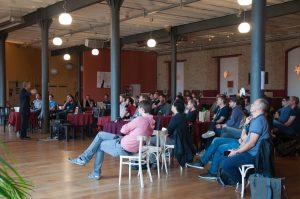Contributing to our software development community can be done in multiple ways. Through code & documentation for existing projects, by starting new projects to showcase new ideas (Disco anyone?) or by running events like meetups or conferences. Some people or companies decide to contribute in more than one of those areas. Besides contributing to and maintaining open-source projects ourselves, we at bitExpert decided to run a unconference event for the local developer community in the Rhein-Neckar region. This blog post covers some lessons we have learned after organizing the unKonf for 5 years in a row.
But first things first. What is an unconference? Unlike traditional conference formats, an unconference has a self-organizing character, relying on the passion and the responsibility of the attendees. It is up to the attendees to decide which sessions they want to hear or present. Those sessions do not need to be of technical nature or generally focused on IT topics, there’s room for sessions about beekeeping, beer brewing or anything else attendees are interested in. What sets our unKonf apart from other unconferences? From the beginning on we focused on running the event in our office space. This limits the number of attendees to about 80 to 90. Since most of them are friends, the whole atmosphere is very open, relaxed and friendly. Unlike other unconference events we decided to start with a keynote session to inspire attendees and to set the general tone of the unKonf. Over the years we had a great line-up of keynote speakers, e.g. Stefan Koopmanschap, Rafael Dohms, Michelangelo van Dam and Jenny Wong. Every keynote speaker shared some very personal insights with the attendees which also added the positive atmosphere of the unconference.
What is needed to run an unconference? Actually not that much: some (office) space, food & drinks and a little bit of time to organize everything. Start small and let it grow over time, that is the best advice I can give you. In the first year we had probably about 30 external attendees. If there is a decent interest in the event, you can organically grow it over the years. The bigger the event gets, the more time you need to invest into marketing, planning upfront and managing the event. The good thing is, the event is an unconference, by definition it is ok if things are not 100% working like they should. Things can go wrong and will go wrong. People won’t complain, that least that’s our experience.
The downside of a small event is that is hard to attract sponsors. In the first few years bitExpert as a company sponsored everything. We did not charge for tickets as we thought it is way too much of a hassle to do that. We always sold out quickly. In the third year it took less than 7 hours after announcing the event until all the tickets were gone. That’s amazing, right? Well, in the end we had more than 30% percent of cancellations, and roughly 15% no shows. Given we had ordered food & drinks for like 90 people, this was a really, really bad situation. That forced us to turn unKonf into a paid event. I feared that people might not come any more or be mad about this move, but nothing like that happened. We still sell out in a couple days and still no one complains if things do not go as they are planned.
I hope I could give you some ideas on how to run an unconference event. If you want to contribute to our software development community but don’t know how, this might be a way that could work for you. If you need more information or guidance, feel free to reach out to me. And don’t forget to follow the unKonf twitter account so that you get noticed once we have set the date for unKonf 2019 😉
